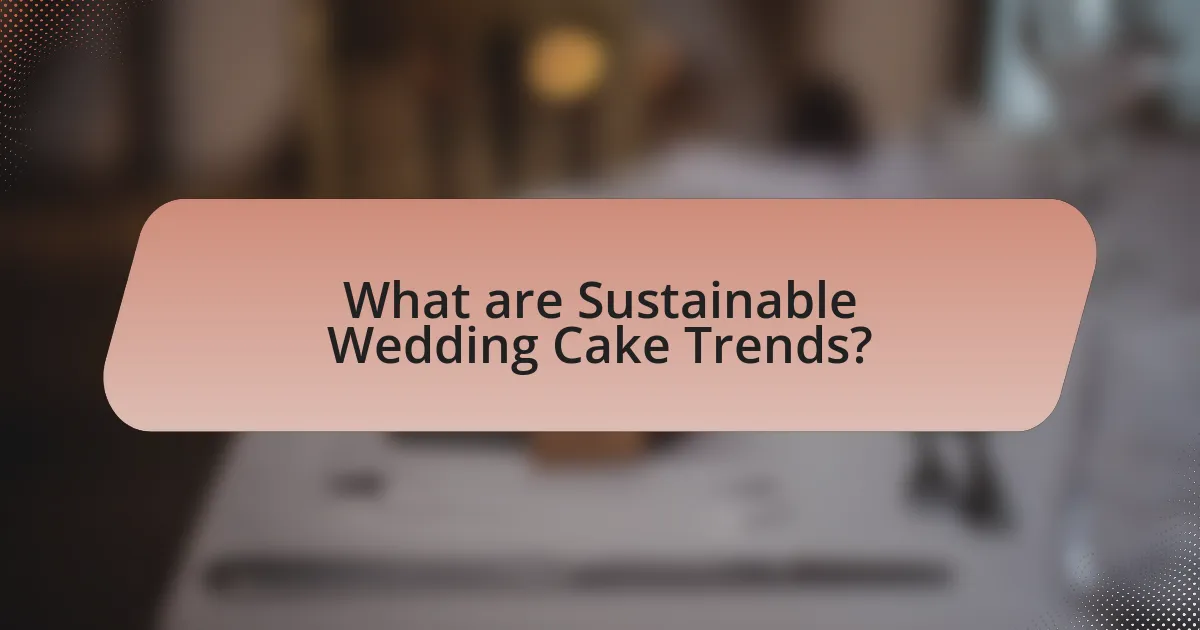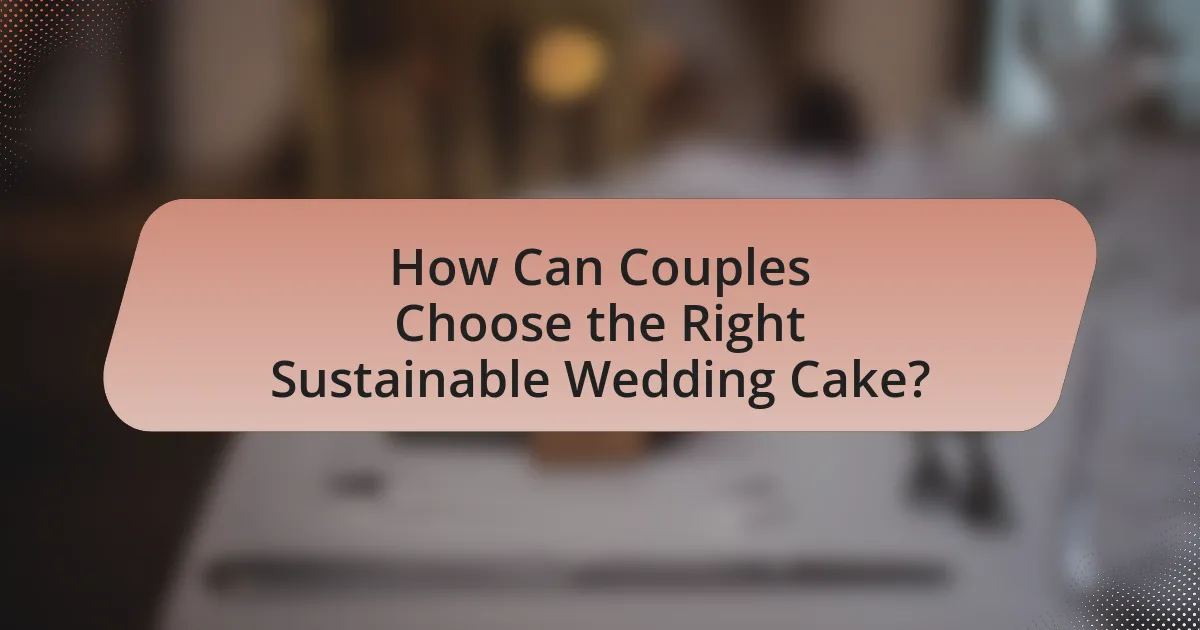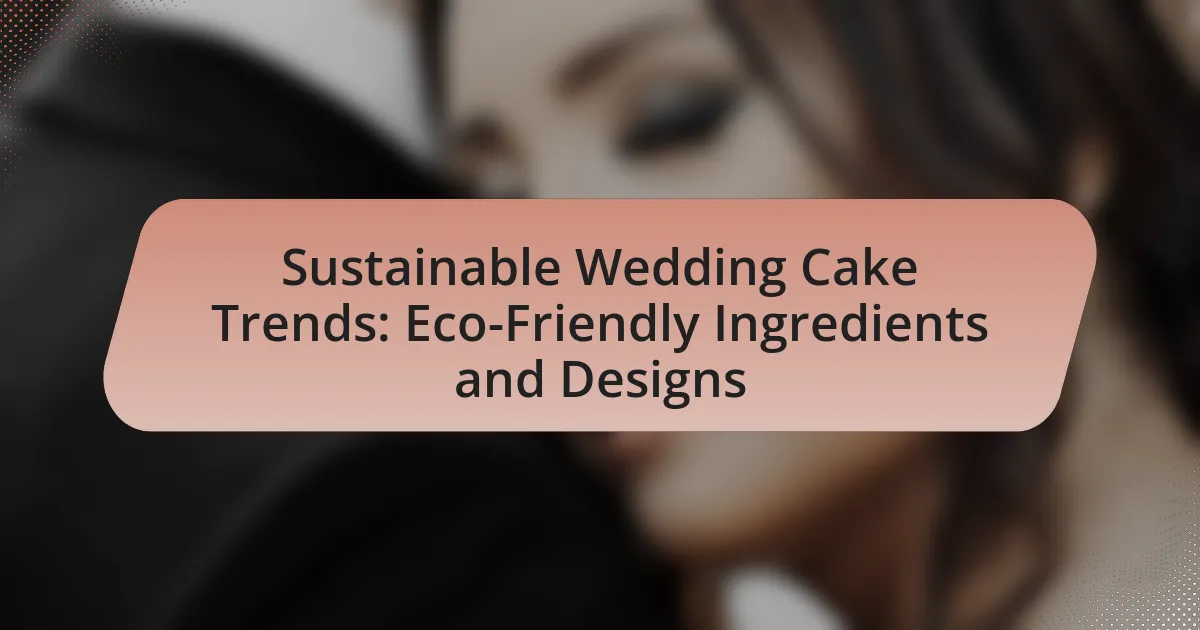Sustainable wedding cake trends emphasize eco-friendly ingredients and designs that reduce environmental impact. Key practices include the use of organic and locally sourced ingredients, plant-based options, and minimalistic designs featuring sustainable materials. The article explores how these eco-friendly ingredients enhance flavor and texture, the importance of sustainability in wedding cake choices, and the environmental benefits associated with selecting sustainable cakes. Additionally, it highlights popular design trends, certifications to look for, and practical tips for couples to ensure their wedding cake aligns with their values of sustainability.

What are Sustainable Wedding Cake Trends?
Sustainable wedding cake trends focus on eco-friendly ingredients and designs that minimize environmental impact. These trends include the use of organic and locally sourced ingredients, which reduce carbon footprints and support local economies. Additionally, many couples are opting for plant-based cakes, which eliminate animal products and often require fewer resources to produce. Designs are also shifting towards minimalism, featuring fewer tiers and simpler decorations made from sustainable materials like edible flowers and natural dyes. These practices not only align with growing environmental consciousness but also reflect a commitment to sustainability in the wedding industry.
How are eco-friendly ingredients changing wedding cake designs?
Eco-friendly ingredients are transforming wedding cake designs by promoting the use of organic, locally sourced, and sustainable components. This shift encourages bakers to create cakes that not only prioritize taste and aesthetics but also environmental responsibility. For instance, the incorporation of natural sweeteners like honey or agave syrup, along with organic flours and plant-based colorings, allows for innovative flavors and designs while reducing the carbon footprint associated with traditional baking ingredients. Additionally, the trend towards minimalistic and rustic designs often complements the use of these eco-friendly ingredients, as seen in the rise of naked cakes and floral embellishments that highlight natural beauty. This movement is supported by a growing consumer demand for sustainable practices in the food industry, reflecting a broader societal shift towards environmental consciousness.
What types of eco-friendly ingredients are commonly used?
Commonly used eco-friendly ingredients in sustainable wedding cakes include organic flour, natural sweeteners like agave syrup or coconut sugar, and locally sourced fruits. Organic flour is cultivated without synthetic pesticides or fertilizers, ensuring a lower environmental impact. Natural sweeteners provide healthier alternatives to refined sugars, while locally sourced fruits reduce carbon footprints associated with transportation. These ingredients not only promote sustainability but also enhance the flavor and quality of the wedding cake.
How do these ingredients impact the flavor and texture of wedding cakes?
Eco-friendly ingredients significantly enhance the flavor and texture of wedding cakes by introducing natural, high-quality components that often yield richer tastes and improved moisture retention. For instance, organic flours, such as whole wheat or spelt, provide a nuttier flavor and denser texture compared to conventional flours, while natural sweeteners like honey or maple syrup add unique flavor profiles and moisture. Additionally, the use of fresh fruits or purees not only infuses vibrant flavors but also contributes to a tender crumb, making the cake more enjoyable. Studies indicate that cakes made with organic ingredients often have a more pronounced flavor due to the absence of artificial additives, which can mask natural tastes. Thus, the choice of sustainable ingredients directly influences both the sensory experience and overall quality of wedding cakes.
Why is sustainability important in wedding cake choices?
Sustainability is important in wedding cake choices because it minimizes environmental impact and promotes ethical sourcing of ingredients. Choosing sustainable cakes often involves using organic, locally sourced, and seasonal ingredients, which reduces carbon footprints associated with transportation and chemical fertilizers. For instance, a study by the Food and Agriculture Organization indicates that local sourcing can cut greenhouse gas emissions by up to 30%. Additionally, sustainable practices in cake design, such as using biodegradable materials for decorations, further contribute to waste reduction. Thus, prioritizing sustainability in wedding cakes aligns with broader environmental goals and supports local economies.
What environmental benefits come from choosing sustainable wedding cakes?
Choosing sustainable wedding cakes significantly reduces environmental impact by utilizing eco-friendly ingredients and practices. Sustainable wedding cakes often incorporate organic, locally sourced ingredients, which minimizes carbon emissions associated with transportation and supports local agriculture. Additionally, these cakes typically avoid artificial preservatives and harmful chemicals, leading to less pollution and waste. Research indicates that organic farming practices can reduce greenhouse gas emissions by up to 50% compared to conventional farming methods. By opting for sustainable wedding cakes, couples contribute to a healthier ecosystem and promote sustainable agricultural practices.
How do sustainable wedding cakes reflect personal values of couples?
Sustainable wedding cakes reflect the personal values of couples by embodying their commitment to environmental responsibility and ethical consumption. Couples who choose sustainable cakes often prioritize eco-friendly ingredients, such as organic flour and locally sourced produce, which align with their values of health and sustainability. Additionally, these cakes may feature minimal packaging and designs that reduce waste, further demonstrating a dedication to reducing their carbon footprint. Research indicates that 70% of couples consider sustainability an important factor in their wedding planning, showcasing a growing trend towards eco-conscious choices that mirror their beliefs and lifestyle.

What are the Key Features of Eco-Friendly Wedding Cakes?
Eco-friendly wedding cakes are characterized by their use of sustainable ingredients, minimal waste practices, and environmentally conscious designs. These cakes often incorporate organic, locally sourced ingredients, reducing the carbon footprint associated with transportation and chemical use. Additionally, eco-friendly wedding cakes typically utilize natural colorings and flavorings, avoiding artificial additives. Many bakers also prioritize sustainable packaging and may offer options for compostable or reusable materials. The emphasis on seasonal ingredients further enhances their sustainability, aligning with the principles of reducing environmental impact while celebrating the occasion.
How do design elements contribute to sustainability?
Design elements contribute to sustainability by incorporating eco-friendly materials, minimizing waste, and enhancing the lifecycle of products. For instance, using biodegradable or recyclable materials in cake decorations reduces environmental impact, while designs that utilize local ingredients lower carbon footprints associated with transportation. Additionally, sustainable design practices, such as modular or reusable components, can significantly decrease waste generated during events. Research indicates that sustainable design can lead to a 30% reduction in resource consumption, demonstrating its effectiveness in promoting environmental responsibility.
What are some popular eco-friendly design trends for wedding cakes?
Popular eco-friendly design trends for wedding cakes include the use of organic ingredients, minimalistic designs, and sustainable decorations. Organic ingredients, sourced from local farms, reduce carbon footprints and promote health. Minimalistic designs often feature simple shapes and fewer tiers, which not only reduce waste but also emphasize natural beauty. Sustainable decorations, such as edible flowers and biodegradable materials, enhance the cake’s aesthetic while being environmentally responsible. These trends reflect a growing commitment to sustainability in the wedding industry.
How can couples incorporate natural decorations into their cake designs?
Couples can incorporate natural decorations into their cake designs by using elements such as fresh flowers, fruits, and edible greenery. Fresh flowers, like roses or lavender, can be arranged on or around the cake to enhance its aesthetic while remaining eco-friendly. Fruits, such as berries or citrus slices, not only add color but also provide a fresh flavor profile, aligning with sustainable practices. Edible greenery, like mint or herbs, can be used to create a rustic look and contribute to the cake’s overall taste. These natural decorations not only beautify the cake but also reflect a commitment to sustainability, as they are often locally sourced and biodegradable.
What certifications or labels should couples look for?
Couples should look for certifications such as USDA Organic, Fair Trade, and Rainforest Alliance when selecting sustainable wedding cakes. These labels indicate that the ingredients used are sourced responsibly, promoting environmental sustainability and ethical practices. For instance, USDA Organic certification ensures that ingredients are grown without synthetic pesticides or fertilizers, while Fair Trade certification guarantees that farmers receive fair compensation for their products. Rainforest Alliance certification focuses on sustainable farming practices that protect ecosystems and biodiversity.
How do certifications ensure the sustainability of cake ingredients?
Certifications ensure the sustainability of cake ingredients by establishing standards that promote environmentally friendly practices in sourcing and production. These certifications, such as USDA Organic or Fair Trade, require producers to adhere to specific guidelines that minimize environmental impact, such as reducing pesticide use, conserving water, and promoting biodiversity. For example, the USDA Organic certification mandates that ingredients are grown without synthetic fertilizers or harmful chemicals, which supports soil health and reduces pollution. Additionally, Fair Trade certification ensures that farmers receive fair wages and work under safe conditions, fostering sustainable agricultural practices that benefit both the environment and local communities.
What are the most recognized eco-labels in the wedding industry?
The most recognized eco-labels in the wedding industry include Fair Trade, USDA Organic, and Rainforest Alliance. Fair Trade certification ensures that products are made under fair labor conditions and sustainable practices, which is crucial for ethically sourced wedding items. USDA Organic certification guarantees that ingredients are grown without synthetic fertilizers or pesticides, promoting environmental health. Rainforest Alliance certification focuses on sustainable farming practices that protect ecosystems and biodiversity. These labels provide consumers with assurance that their wedding choices align with eco-friendly and ethical standards.

How Can Couples Choose the Right Sustainable Wedding Cake?
Couples can choose the right sustainable wedding cake by prioritizing eco-friendly ingredients, local sourcing, and minimal waste designs. Selecting cakes made from organic, seasonal, and locally sourced ingredients reduces the carbon footprint associated with transportation and supports local farmers. Additionally, couples should consider bakers who specialize in sustainable practices, such as using plant-based alternatives and avoiding artificial preservatives. Research indicates that organic ingredients can significantly lower environmental impact, as they are produced without synthetic fertilizers and pesticides. Furthermore, opting for smaller, tiered designs can minimize food waste, as they can be made to serve the exact number of guests. By focusing on these factors, couples can ensure their wedding cake aligns with their sustainability values.
What questions should couples ask their bakers about sustainability?
Couples should ask their bakers about the sourcing of ingredients to ensure they are using organic, locally sourced, and seasonal products. This inquiry is crucial because using local ingredients reduces carbon footprints associated with transportation and supports local economies. Additionally, couples should inquire about the baker’s waste management practices, such as whether they compost or recycle materials, which contributes to sustainability efforts. Another important question is whether the baker uses sustainable packaging, as this can significantly reduce environmental impact. Lastly, couples should ask about the baker’s commitment to ethical practices, including fair trade sourcing for ingredients like chocolate and sugar, which promotes social responsibility in the supply chain.
How can couples verify the sourcing of ingredients used in their cakes?
Couples can verify the sourcing of ingredients used in their cakes by directly asking their baker for detailed information about the origins of each ingredient. This inquiry should include questions about whether the ingredients are organic, locally sourced, or sustainably produced. Many reputable bakers provide transparency by sharing supplier information or certifications, such as USDA Organic or Fair Trade, which can serve as proof of responsible sourcing. Additionally, couples can research the suppliers mentioned by the baker to confirm their sustainability practices and ethical standards.
What should couples consider regarding packaging and delivery sustainability?
Couples should consider using biodegradable or recyclable packaging materials for their wedding cake to enhance sustainability. This choice minimizes environmental impact by reducing waste and promoting the use of materials that can decompose naturally or be repurposed. Additionally, couples should evaluate the delivery methods, opting for local suppliers to decrease carbon emissions associated with transportation. Research indicates that local sourcing can significantly lower the carbon footprint, as transportation accounts for a substantial portion of greenhouse gas emissions in food delivery. By prioritizing these sustainable practices, couples can contribute to a more eco-friendly wedding celebration.
What are some tips for planning a sustainable wedding cake?
To plan a sustainable wedding cake, prioritize using organic and locally sourced ingredients. This approach reduces carbon footprints associated with transportation and supports local farmers. Additionally, consider choosing a cake design that minimizes waste, such as a smaller cake paired with a dessert table featuring seasonal fruits and treats. Opting for natural food colorings and avoiding artificial additives further enhances sustainability. Research indicates that organic farming practices can reduce environmental impact by up to 50% compared to conventional methods, reinforcing the benefits of selecting organic ingredients for your cake.
How can couples balance aesthetics and sustainability in their cake choices?
Couples can balance aesthetics and sustainability in their cake choices by selecting eco-friendly ingredients and designs that are visually appealing. For instance, using organic, locally sourced ingredients not only supports sustainable agriculture but also enhances the cake’s flavor and presentation. Additionally, couples can opt for minimalist designs that require fewer resources and materials, such as simple buttercream finishes or natural decorations like fresh fruits and edible flowers. Research indicates that cakes made with organic ingredients can reduce environmental impact by minimizing chemical use and promoting biodiversity. By prioritizing these sustainable practices, couples can achieve a beautiful cake that aligns with their values.
What are common pitfalls to avoid when selecting a sustainable wedding cake?
Common pitfalls to avoid when selecting a sustainable wedding cake include overlooking ingredient sourcing, neglecting local bakeries, and ignoring packaging waste. Failing to verify that ingredients are organic or ethically sourced can lead to unintentional environmental harm. Choosing a local bakery not only supports the community but also reduces carbon emissions associated with transportation. Additionally, selecting cakes with excessive or non-recyclable packaging contributes to waste, undermining sustainability efforts. By addressing these factors, couples can ensure their wedding cake aligns with their eco-friendly values.
